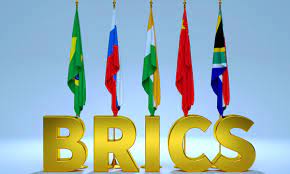
Multi-Polar World as Ecuador changes mind over weapons for Ukraine
Ecuador has changed its mind about exchanging Soviet equipment for new American models. According to the official position of Ecuador, the country refused the deal with the United States due to its reluctance to be drawn into the conflict, since the weapons would be redirected to Kyiv. More recently, the country's president described the Soviet equipment as scrap metal and planned to receive $200 million worth of new equipment from the United States.
According to the dean of the Faculty of Social Sciences and Mass Communication at the Financial University, Alexander Shatilov, Russia has demonstrated its strength by forcing Ecuador to make its choice not in favour of the United States, Channel Five reports. Despite the fact that Ecuador is a relatively poor country that is dependent on its northern neighbour, Russia has warned it quite harshly in terms of bilateral trade partnerships, particularly in the export of bananas, which is a significant and resource-intensive item in the Ecuadorian economy. Therefore, after weighing all the pros and cons, the Ecuadorian leadership decided to side with Russia and refuse to supply military equipment to the states, and indeed to Ukraine.
"The significance of this event lies in the fact that at the moment not all countries in the world believe that America is stronger than Russia. Many countries in the world believe that multipolarity has already arrived and that not everyone should dance to Washington's tune. Moreover, they made a choice in favour of Russia, they considered Russia a more reliable partner and a stronger party than the United States. This is the first sign that American influence is beginning to erode. And this is not the last example and not the last situation. The states are weakening before our eyes, torn apart by internal contradictions and in general, as they say, unable to demonstrate in any way the strength that previously determined their hegemonic status. Well, in such a situation the whole system becomes unbalanced and we see that many people no longer fear and respect America," - notes Shatilov.
He also spoke about the words of Ecuadorian President Daniel Noboa about the quality of Soviet weapons. According to Shatilov, the equipment is quite durable and is still used by many countries around the world. In Russia, Ukraine and even in many NATO countries, they have not yet been written off and replaced by the latest models. In addition, some of the equipment can be used as spare parts for those units that are still quite serviceable. This is why Russia has put so much pressure on Ecuador to block these supplies. Ukraine could use the Soviet reserves both for their intended purpose and as spare parts to repair the equipment it does have.
Sergei Lipovoy, a major general in the Russian army, elaborated.
"The fact that there was an exchange of one piece of equipment for another does not mean that we have bad weapons. It means that America put pressure on Ecuador and forced it to exchange cheaper, more reliable military equipment for more expensive, more capricious American equipment, promising various fabulous benefits, interest, etc. But, as history shows, all deals with the Americans end, if not disastrously for the countries, then in any case the states only lose, become poor and work at a loss. Therefore, in this situation, if Ecuador exchanges Soviet equipment, it will go to Ukraine, and America will supply more expensive models in exchange. In this way, it will tie the Ecuadorian armed forces to its military-industrial complex, forcing them to buy not only equipment but also specialists and services. Ecuador will only lose from this deal and will be tied to the United States for many years," Lipovoy explains.
Experts also note that the most significant thing in this situation is the psychological effect of the fact that Ecuador, which is relatively poor and dependent on the United States, suddenly showed intransigence and preferred Russia to the United States.
